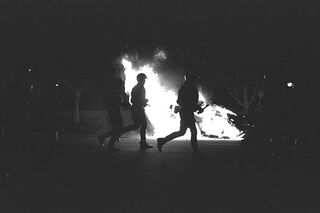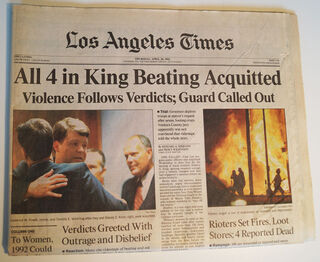Bias
What to Expect in the Aftermath of the Chauvin Trial
3 lessons from the social science that followed the Rodney King beating.
Posted March 31, 2021 Reviewed by Davia Sills
Key points
- Legal injustices have negative impacts for the whole community, not just the victim.
- Economic impacts were felt in Los Angeles for a decade after the Rodney King beating, trial, and riots.
- Media coverage is a critical factor in the narrative of trials and mass responses afterward.
I am old enough to remember pretty vivid images of the Rodney King beating. And the Los Angeles riots that ensued after the four officers caught on camera beating Mr. King were acquitted in the following trial. In many ways, for persons of my generation, the Rodney King beating and the L.A. riots were an introduction to racial injustice in America.
Of course, there have been numerous examples of racial injustices and resulting protests since the early 1990s. The killing of George Floyd continued this tragic pattern.

Learning from the social science following racial injustice and mass responses
The case of King and the L.A. riots, however, delivered something unique. Social scientists were able to conduct meaningful studies in the years that followed. Many of these studies provide some insight into what we can expect if Derek Chauvin is acquitted in the George Floyd murder trial.
1. Social-emotional well-being is affected in the aftermath.
It has long been established that communities can be traumatized by high-profile or intense instances of discrimination and violence. Los Angeles is no exception to this pattern. Several studies provide insights into the possible effects of racial injustices and the civil unrest that follows.
Social work researchers interviewed 144 Black youth after the Rodney King verdict and L.A. riots. These youth indicated common experiences of discrimination from employers and a lack of job opportunities. The emotional toll was equally troubling. The youth experienced high degrees of hopelessness, isolation, and anger as a result of the discrimination following the L.A. riots.
Another study addressed emotional and behavioral responses after the L.A. riots. People reporting being highly affected by the riots were more likely to spend time alone. Additionally, spending time with familiar persons alleviated the harmful emotional impacts of the riots. In short, social withdrawal and social support appear to be important considerations after violent responses to racial injustice.
2. Economic impacts may follow.
Beyond the physical, emotional, and social consequences of legal trials and riots are the economics. More than a decade following the Rodney King case, economists conducted a time-series study to understand the financial impacts of these events. The findings were clear: Los Angeles, particularly areas central to the riots, suffered economically.
Taxable sales dropped more than 1 percent in the short term. While this number seems low in raw monetary figures, study authors estimated that a $165 million decline in taxable sales occurred in the months following the riots. Moreover, it took more than a decade for Los Angeles to recover. A total taxable revenue of more than $3.8 billion was lost over this time period.
The economic impacts of racially biased legal outcomes and subsequent violent responses are deeply concerning if we rely on these findings as a foreshadowing of what could follow the Chauvin trial.

3. Institutional prejudice begets institutional prejudice.
The not-guilty verdict in the trial of officers who beat Rodney King was widely considered racially biased. One interesting aspect of the shifting post-verdict narrative was the media coverage.
A pair of social scientists conducted a study of the nature of major media coverage of the trial. The study authors arrived at two important conclusions. First, the media only seemed to bring attention to unjust legal procedures after the trial was over. Second, racism seemed to be raised as a cause for the verdict and procedural biases only after the trial ended.
What do these findings mean in practical terms? If we are to use media coverage as a gauge for the status of racial matters in America, we only seem to be paying attention after legal outcomes are determined. While this may be no surprise, I think the point is poignant.
George Floyd's death has already been the subject of mass protest across the country. One is left to wonder what level of response will occur if Mr. Chauvin is acquitted.


